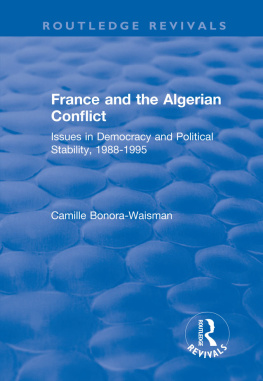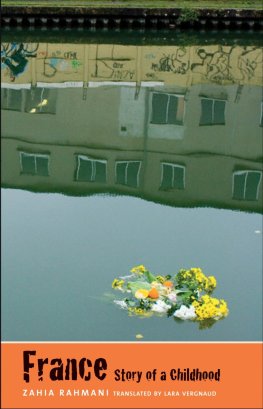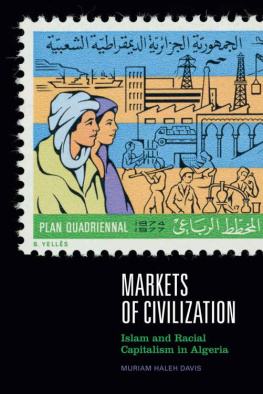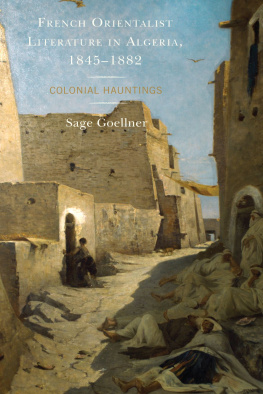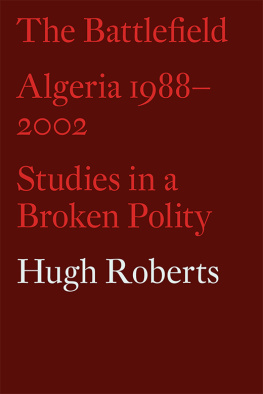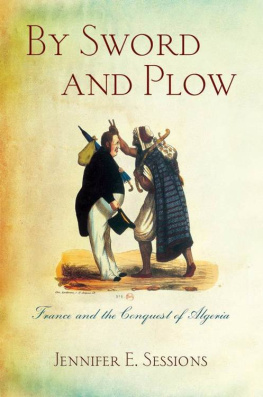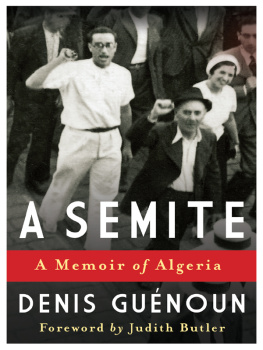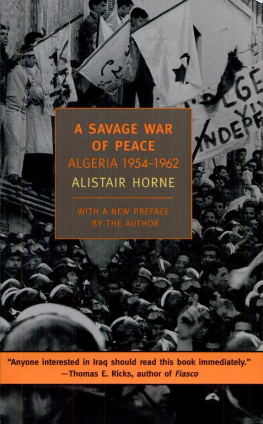FRANCE AND THE ALGERIAN CONFLICT
To my family and Doron
France and the Algerian Conflict
Issues in Democracy and Political Stability, 1988-1995
Camille Bonora-Waisman
First published 2003 by Ashgate Publishing
Reissued 2018 by Routledge
2 Park Square, Milton Park, Abingdon, Oxon OX14 4RN
711 Third Avenue, New York, NY 10017, USA
Routledge is an imprint of the Taylor and Francis Group, an informa business
Copyright Camille Bonora-Waisman 2003
All rights reserved. No part of this book may be reprinted or reproduced or utilised in any form or by any electronic, mechanical, or other means, now known or hereafter invented, including photocopying and recording, or in any information storage or retrieval system, without permission in writing from the publishers.
Notice:
Product or corporate names may be trademarks or registered trademarks, and are used only for identification and explanation without intent to infringe.
Publisher's Note
The publisher has gone to great lengths to ensure the quality of this reprint but points out that some imperfections in the original copies may be apparent.
Disclaimer
The publisher has made every effort to trace copyright holders and welcomes correspondence from those they have been unable to contact.
A Library of Congress record exists under LC control number: 00109129
ISBN 13: 978-1-138-71969-9 (hbk)
ISBN 13: 978-1-315-19416-5 (ebk)
In its general terms, the subject of this book is the result of a deal dating back to my post-graduate studies. It was defined as part of a give-and-take agreement between the research interests of the Leeds University Politics Department and my own, with, in the background, the prospect of a grant. I must, therefore, thank the Politics Department first among all for its generosity without which this project could not have been mine. The perspicacity and flexibility of my interviewers must also be recognised. Interested in the European Union's policy towards democratization, they suggested Algeria as a case-study. But they also gave me the freedom to define the boundaries of my research so that I was able to specifically focus on France's policy towards Algeria well after the short-lived democratic experience of that country.
In doing this research, I have incurred many debts. Without the testimonies of members of the French political establishment, much of this work would have been beside the point. Jean Audibert, Claude Cheysson, Roland Dumas and Georges Morin helped me a great deal by giving me insights into the foreign policy decision-making process and into the realm of perceptions and feelings about Algeria. I owe them more than they perhaps realise. High civil servants also brought an illuminating contribution to my understanding of the French government's perceptions of Algeria's crisis and of "how things work" between the two states. The time spared by Christophe igot and Lucile Schmid was not lost - at any rate not for me!
Jean-Pierre Brevost, from the Total Oil Company, was very helpful in explaining the logics of contemporary oil trade, the scope of Algeria's hydrocarbon reforms and the technical aspects of Franco-Algerian oil trade. He also provided me with a general vision of what may be coined the "business view" of instability in Algeria, On the Algerian side, Sadek Boussena, who spent more hours with me than I could expect, was of a fabulous assistance to the many questions I had about Algeria and Franco-Algerian relations.
In the academic world, I am of course indebted to many scholars through the work they did on Algeria, Islamism, and Franco-Algerian relations. I would like to thank those who personally made a contribution to this work. Franois Burgat, with his eternal brainstorming effect, was a good mentor in introspection about ready-made presumptions. Throughout my research, Simon Bromley, George Joff and Hugh Roberts made useful comments and constructive criticisms, thus, helping me to structure my thoughts.
Finally, I must thank my parents for having been so supportive and, not the least, for having borne my obsessions.
- AIS Arme Islamique du Salut (Islamic Salvation Army, Algeria)
- AMU Arab Maghreb Union
- Bcm Billions of cubic meters
- BDF Banque de France (French Central Bank)
- CDS Centre des Dmocrates Sociaux (Social Democrats, France)
- COFACE Compagnie Franaise d'assurance pour le Commerce Extrieur (public company for export insurance, France)
- DGSE Direction Gnrale de la Scurit Extrieure (French intelligence)
- DREE Direction des Relations Economiques Extrieures (Department for Foreign Economic Relations, Economic Affairs Ministry, France)
- ECU European Currency Unit
- EEC European Economic Union
- EU European Union
- FAF Fraternit Algrienne en France (Algerian Brotherhood in France)
- FDI Foreign direct investment
- FFS Front des Forces Socialistes (Socialist Forces Front, Algeria)
- FIS Front Islamique du Salut (Islamic Salvation Front, Algeria)
- FLN Front de Libration Nationale (National Liberation Front, Algeria)
- FN Front National (National Front, France)
- GDF Gaz de France (French gas public utility)
- GIA Groupe Islamique Arm (Islamic Armed Group, Algeria)
- HAMAS Mouvement pour la Socit Islamique (Movement for an Islamic Society, Algeria)
- HSC High State Council
- IAEA International Atomic Energy Agency
- IBRD International Bank for Reconstruction and Development
- IEA International Energy Agency
- IMF International Monetary Fund
- LNG Liquefied Natural Gas
- MAE Ministre des Affaires Etrangres (Foreign Affairs, France)
- MAJD Mouvement Algrien pour la Justice et le Dveloppement (Algerian Movement for Justice and Development)
- MCB Mouvement Culturel Berbre (Berber Cultural Movement, Algeria)
- MDA Mouvement Dmocratique Algrien (Algerian Democratic Movement)
- MEED Middle East Economic Digest
- MEI Middle East International
- MIA Mouvement Islamique Arm (Islamic Armed Movement, Algeria)
- Mmt Millions of metric tons
- MNI Mouvement de la Nahda Islamique (Movement of the Islamic Renaissance, Algeria)
- MRP Mouvement pour la Rpublique (Movement for the Republic, Algeria)
- OECD Organisation of Economic Co-operation and Development
- OPEC Organisation of the Petroleum Exporting Countries
- PAGS Parti de l'avant-guarde Socialiste (Socialist Vanguard Party, Algeria)
- PCF Parti Communiste Franais (French Communist Party)
- PRA Parti du Renouveau Algrien (Algerian Renewal Party)
- PS Parti Socialiste (Socialist Party, France)
- PT Parti des Travailleurs (Workers' Party, Algeria)
- RCD Rassemblement pour la Culture et la Dmocratie (Rally for Culture and Democracy, Algeria)
- RNP Rassemblement National Patriotique (Patriotic National Rally, Algeria)
- RPR Rassemblement pour la Rpublique (Rally for the Republic, France)
- SOAS School of Oriental and African Studies (University of London)
- UDF Union pour la Dmocratie Franaise (Union for French Democracy)
- UGTA Union Gnrale des Travailleurs Algriens (Algerian Workers' Union)
- UN United Nations
Introduction:
France and Algeria's Short-lived Democratization Process
From its Independence from France in 1962 until the beginning of a democratization process in 1989, Algeria was a one-party state. The FLN (National Liberation Front), which co-opted or eliminated the various nationalist movements during the War of Liberation (1954-62) and whose armed wing, the ALN (National Liberation Army), fought the war against French occupation, was established as unique party in 1963. In practice, however, the FLN never ruled Algeria. Its role was limited to the control and mobilization of Algerian society for the implementation of policies designed by the Military, the actual nucleus of power. In 1989, following the out-break of violent popular riots throughout the country (October 1988), the Algerian Administration engaged in a fast-track democratization process which came to parallel a policy of economic liberalization initiated in the early 1980s. Democratization was characterised by the introduction of multi-party politics and, thus, the abolition of the one-party system. The new 1989 Constitution, which was approved by referendum, clearly separated the executive, legislative and judicial functions and waived major principles that had guided the Algerian Revolution such as Socialism, Non-alignment, and Third-Worldism. The Army was entrusted with the sole task of defending the country and was no longer to be viewed as the 'Guardian of the Revolution'. Lastly, civil society was left to organize itself.

